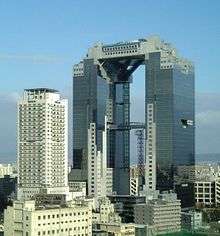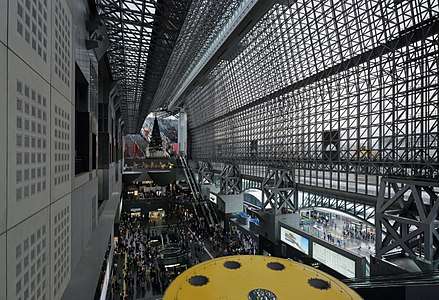Hiroshi Hara (architect)
Hiroshi Hara (原 広司, Hara Hiroshi, born 9 September 1936)[1] is a Japanese architect and author on architecture. His major works, including Kyōto Station, the Umeda Sky Building in Osaka, the Yamato International building in Tokyo, the Sapporo Dome in Hokkaidō, and other important structures in Japan, have earned many awards. With a doctorate in engineering, he was a professor at the University of Tokyo until 1997, and has held an emeritus position since that time.
Hiroshi Hara | |
|---|---|
 Umeda Sky Building, Osaka | |
| Born | Hiroshi Hara September 9, 1936 |
| Nationality | Japanese |
| Alma mater | University of Tokyo |
| Occupation | Architect |
| Buildings | |

Education
Hiroshi Hara graduated from the University of Tokyo with a BA in 1959, and subsequently earned an MA in 1961 and a PhD in 1964, also from the University of Tokyo. He became an associate professor in the Faculty of Architecture at Tokyo University in 1964 and an associate professor at the Institute of Industrial Science at the University of Tokyo in 1969. He attended Harvard University's Summer Seminar in 1968. He collaborates with Atelier Φ for design practices from 1970. In 1982, Hara became Professor at the Institute of Industrial Science at the University of Tokyo, and in 1997, Professor Emeritus at the University of Tokyo. He changed the designation to "Hiroshi Hara + Atelier Φ" from 1999.
Publications
Hiroshi Hara is not only known as an architect but also as an author of theoretical essays on architecture and cities, amongst others the essay "Discrete City".[2]
- Hiroshi Hara (2009). Yet: Hiroshi Hara (in Japanese) (1st ed.). Tokyo, Japan: TOTO Pub. ISBN 9784887063075.
Works
- 1974 : Hara House, Tokyo
- 1986 : Tasaki Museum of Art, Karuizawa, Nagano
- 1987 : Naha Municipal Josei Primary School, Naha, Okinawa
- 1987 : Yamato International, Ōta, Tokyo
- 1987 : Kenju Park 'Forest House', Nakaniida, Miyagi Prefecture
- 1988 : Iida City Museum, Iida, Nagano Prefecture
- 1992 : Uchiko Municipal Ose Middle School, Uchiko, Ehime
- 1993 : Umeda Sky Building, Kita-ku, Osaka
- 1997 : Kyoto Station Complex, Shimogyo-ku, Kyoto
- 1998 : Miyagi Prefectural Library, Sendai, Miyagi Prefecture
- 2000 : Hiroshima Municipal Motomachi High School, Hiroshima
- 2001 : Sapporo Dome, Sapporo, Hokkaidō
- 2001 : University of Tokyo, Komaba II Campus, Tokyo
- 2003 : Tokamachi Stage, Tokamachi, Niigata
- 2004 : Casa Experimental, Montevideo, Uruguay
- 2005 : Casa Experimental, Cordoba, Argentina
- 2005 : Shimokita Snow-Resistant Dome, Mutsu, Aomori
- 2007 : Aizu Gakuho Middle School and High School, Aizuwakamatsu, Fukushima Prefecture
- 2010 : Casa Experimental, La Paz, Bolivia
Notes
- "Profile of Hiroshi Hara, Commissioner". New Trends of Architecture. Archived from the original on 4 December 2008.
- Discrete City: Hiroshi Hara
References
- Discrete City: Hiroshi Hara, Architects – HARA
- Hiroshi Hara, The Floating World of Architecture, H. Hara, B. Bognar, John Wiley & Sons; 2001
External links
![]()